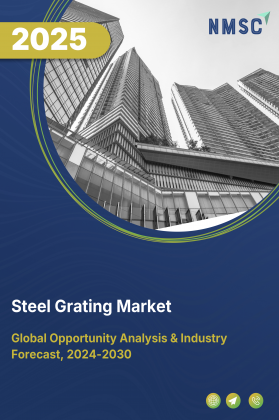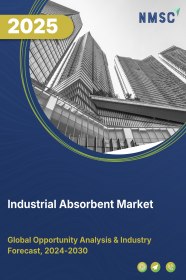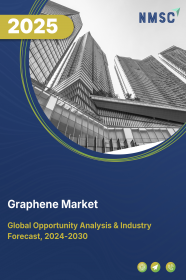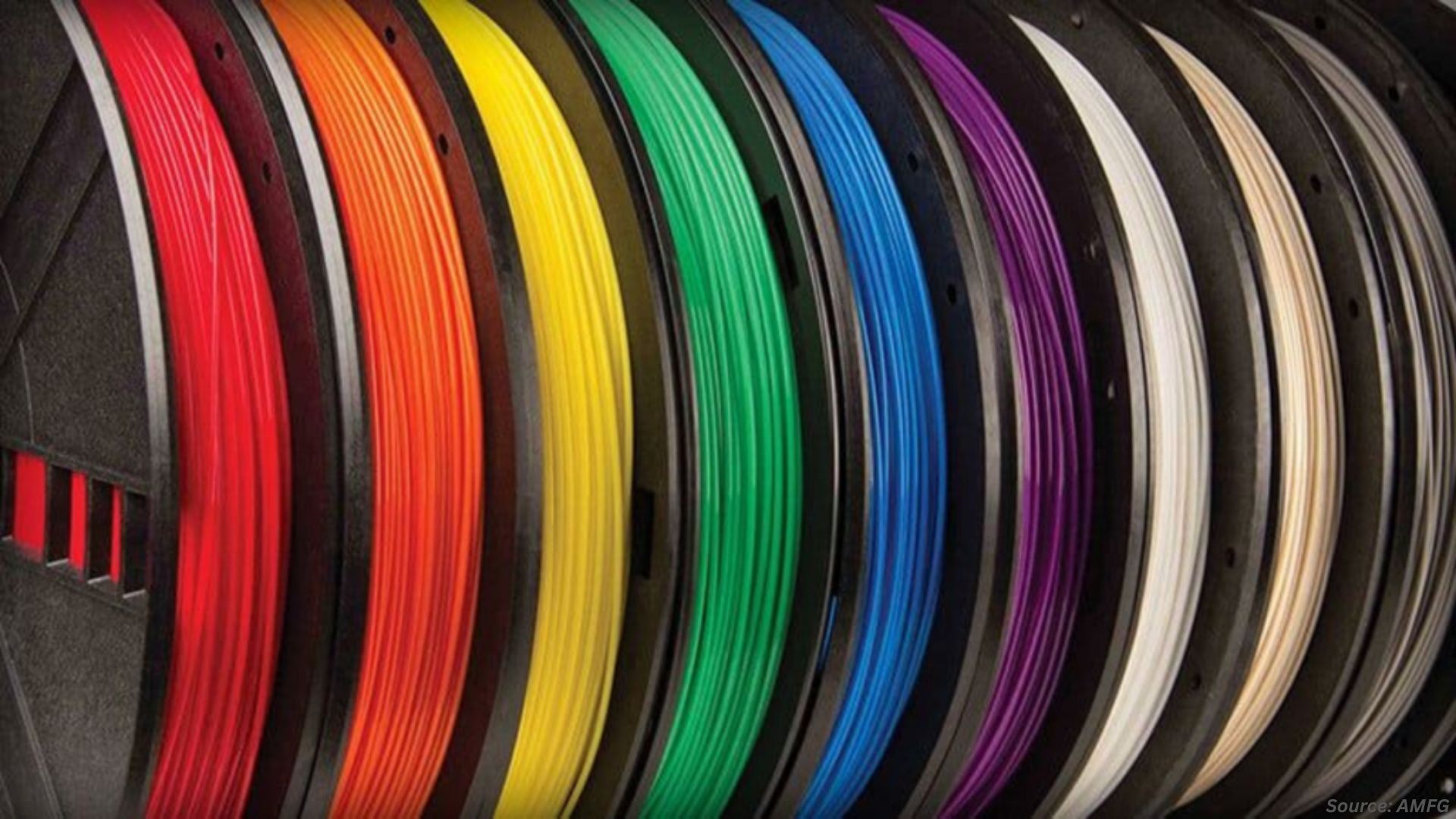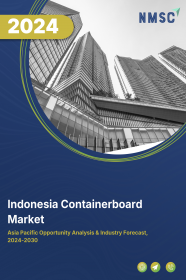
Indonesia Containerboard Market by Material (Virgin Fibres, Recycled Fibres, and Mixed Fibres), by Type (Linerboard and Flutting), by Wall Type (Single Face, Single Wall, Double Wall, and Triple Wall), and by End-User (Food and Beverage, Consumer Electronics, Personal Care and Cosmetics, and Others End-User) – Opportunity Analysis and Industry Forecast, 2024–2030
Industry: Materials and Chemical | Publish Date: 30-Dec-2024 | No of Pages: 112 | No. of Tables: 79 | No. of Figures: 44 | Format: PDF | Report Code : MC2653
Indonesia Containerboard Market Overview
The Indonesia Containerboard Market size was valued at USD 2.33 billion in 2023 and is predicted to reach USD 3.11 billion by 2030, with a CAGR of 3.88% from 2024 to 2030. In terms of volume the market size was 3477 kilotons in 2023 and is projected to reach 5424 kilotons in 2030, with a CAGR of 5.83% from 2024 to 2030.
The containerboard market refers to the segment of the paper industry that produces a type of paperboard specifically designed for the manufacturing of corrugated boxes and packaging materials. This encompasses the production, distribution, and consumption of containerboard products by various industries for packaging purposes.
Containerboards are durable and strong paperboard which is primarily recycled from old corrugated containers (OCC) and mixed paper, as well as virgin fibres obtained from wood pulp. These boards offer numerous advantages, including their strength and durability, which ensures reliable protection for products during transit and storage, significantly reducing the risk of damage.
Moreover, these fiberboards offer a lightweight feature which minimizes shipping costs and environmental impact. Its versatility allows for customization to meet diverse packaging needs, from small boxes to large containers.
The Rising Adoption of Containerboards in Food and Beverage Industry Drives the Indonesia Containerboard Market Growth
The rapid growth of Indonesia’s food and beverage sector, coupled with rising demand for packaged food and beverage products, drives the need for containerboards for effective packaging.
The average monthly expenditure per capita for food and beverages increased from USD 40.61 in 2021 to USD 43.41 in 2022, indicating a rise in consumer demand for packaged products. As the food and beverage industry continues to expand, the demand for containerboard is expected to rise accordingly, further propelling the growth of containerboard industry.
The Increasing Trade Activities Within the Nation is Driving the Demand for Containerboards
The rapid expansion of trade activities in Indonesia led to an increased demand for packaging materials to facilitate the movement of goods across borders. Containerboard, known for its durability and versatility, plays a crucial role in providing reliable packaging solutions for products destined for overseas markets.
Indonesia's exports reached USD 320 billion in 2022, making it the world's 26th largest exporter. Over the past five years, exports grew by USD 130 billion, from USD 190 billion in 2017 to USD 320 billion in 2022. This substantial growth in exports is expected to drive the demand for containerboard, solidifying its importance in Indonesia's packaging industry.
The Presence of Alternative Materials Restrain the Indonesia Containerboard Market Expansion
The rise of alternative packaging materials such as plastics, metals, glass, and composites pose a potential challenge to the demand for containerboards. These substitutes could threaten these paperboards, especially if they offer cost advantages or superior performance in specific applications.
Innovative advancements in plastic, metal, glass, or composite materials may lead to their increased adoption by industries traditionally reliant on containerboard, potentially resulting in a loss of the Indonesia containerboard market share for corrugated packaging products, particularly where alternative materials offer unique benefits.
Additionally, the increasing focus on sustainability and environmental concerns may further drive the shift towards eco-friendly and recyclable alternatives, prompting containerboard manufacturers to adapt by developing more sustainable products to meet evolving consumer and regulatory demands.
The Integration of Nanotechnology and Smart Packaging in Containerboard Creates Market Opportunity
The Indonesia containerboard market is expected to experience significant growth as it incorporates emerging technologies such as nanotechnology and smart packaging. These advancements enable the development of high-performance, cost-effective, and versatile containerboard products with enhanced customization and branding capabilities.
Additionally, the integration of nanotechnology and smart packaging solutions will allow for the creation of containerboard products with advanced features such as active protection and real-time monitoring.
This fusion of technology and innovation will unlock new opportunities for the market, driving its growth and expansion in the years to come. With these advancements driving innovation, the sector is poised for significant growth in the upcoming years.
Competitive Landscape
Several market players operating in the Indonesia containerboard industry include Prima Jaya Eratama, ePac Flexible Packaging, PT. Indonesia Topan Printing, PT Dinakara Putra, Purity Flexpack Ltd, Asia Pulp and Paper, Rengo Co. Ltd, Smurfit Kappa, AR Packaging Group, Associated Packaging Indonesia PT, and others.
Indonesia Containerboard Market Key Segments
By Material
-
Virgin Fibres
-
Recycled Fibres
-
Mixed Fibres
By Type
-
Linerboard
-
Kraftliner
-
Testliner
-
Flutting
By Wall Type
-
Single Face
-
Single Wall
-
Double Wall
-
Triple Wall
By End-User
-
Food and Beverage
-
Personal Care and Cosmetics
-
Consumer Electronics
-
Others End-User
Key Players
-
Prima Jaya Eratama
-
ePac Flexible Packaging
-
PT. Indonesia Topan Printing
-
PT Dinakara Putra
-
Purity Flexpack Ltd
-
Asia Pulp and Paper
-
Rengo Co. Ltd
-
Smurfit Kappa
-
AR Packaging Group
-
Associated Packaging Indonesia PT
REPORT SCOPE AND SEGMENTATION:
|
Parameters |
Details |
|
Market Size In 2023 |
USD 2.33 Billion |
|
Revenue Forecast In 2030 |
USD 3.11 Billion |
|
Growth Rate (Value) |
CAGR of 3.88% from 2024 to 2030 |
|
Market Volume in 2023 |
3477 kilotons |
|
Volume Forecast in 2030 |
5424 kilotons |
|
Growth Rate (Volume) |
CAGR of 5.83% from 2024 to 2030 |
|
Analysis Period |
2023–2030 |
|
Base Year Considered |
2023 |
|
Forecast Period |
2024–2030 |
|
Market Size Estimation |
Billion (USD) |
|
Growth Factors |
|
|
Companies Profiled |
10 |
|
Market Share |
Available for 10 companies |
|
Customization Scope |
Free customization (equivalent up to 80 working hours of analysts) after purchase. Addition or alteration to country, regional, and segment scope. |
|
Pricing And Purchase Options |
Avail customized purchase options to meet your exact research needs. |




















 Speak to Our Analyst
Speak to Our Analyst



